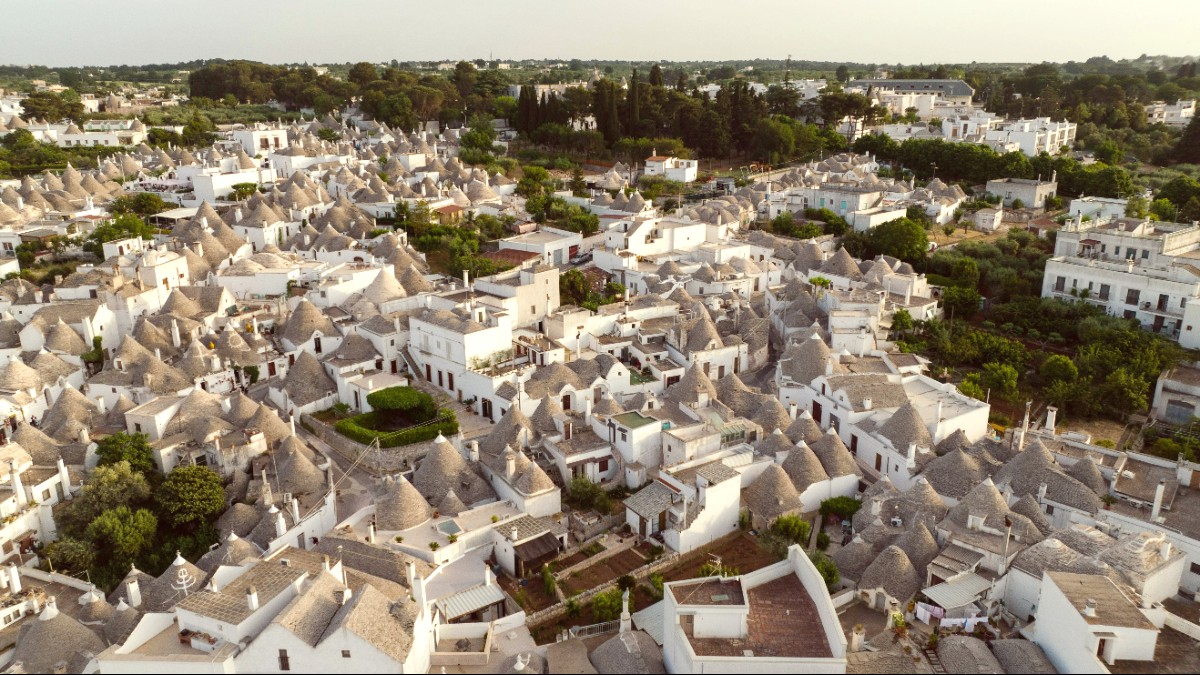
Puglia, Italy
Temperatures during spring are mild and comfortable, ranging from 15-22°C (59-72°F). Rainfall is moderate, and the landscape with wildflowers. This period offers pleasant weather for walking and outdoor exploration. Days are longer, and the air fresh, making it an inviting time to explore the town without the intense heat of summer. Evenings are cool, a Light jacket is useful.
Summer brings hot and dry conditions, with temperatures frequently reaching 28-35°C (82-95°F) and often exceeding these figures. Humidity levels are high, which can make the heat feel more intense. Rainfall is minimal. This is the peak tourist season, attracting visitors who enjoy warm weather and lively atmospheres. Days are long, providing ample time for sightseeing, though midday sun can be strong.
Puglia experiences intense heatwaves in summer, with temperatures potentially exceeding 40°C (104°F). Plan outdoor activities carefully. Hydration; drink water. Wear light clothing, hats, High-SPF sunscreen. Seek shade midday.
Heavy rainfall occurs in late autumn and winter. While typically not prolonged, intense downpours lead to localized flooding. Pack waterproof footwear and a reliable rain jacket during these months.
Extended daylight hours for sightseeing.
Longer sightseeing days.
Overwhelming crowds, highest prices for accommodation and flights. Intense heat, requiring frequent breaks and hydration.
Pleasant temperatures for sightseeing and walking.
Fewer crowds, more reasonable prices. Many local festivals occur.
Some smaller businesses might have shorter hours. Higher chance of rain; bring a light jacket or Umbrella.
Few tourists, authentic local experience.
Lowest prices. Quiet atmosphere for exploration and local interaction. Trulli appear magical with Christmas decorations.
Cooler temperatures, more frequent rainfall. Some tourist-focused businesses might be closed. Shorter daylight hours.
Spring (April-May) and Autumn (September-October) offer comfortable temperatures for extended walks through the trulli districts and surrounding areas. The air is crisp, and the light is good. Early morning or late afternoon in the shoulder seasons provide the best light (golden hour) and fewer crowds for photography. Overcast days in winter create soft, even light.
Autumn (September-November) is a prime time for food enthusiasts. This period coincides with the grape harvest (Vendemmia) and the beginning of olive oil production, presenting opportunities for wine tours, olive oil tastings, and participation in local food festivals.
Check local calendars for specific dates, as many traditional religious festivals and cultural events occur in spring (e.g., Easter processions) or late summer/early autumn.
Patron saint festivals in late summer/early autumn are a local tradition.
The festival for Saints Cosmas and Damian in late September is a remarkable event in Alberobello.
Many events happen from late spring to early autumn.
Activities like wine tours and olive oil tastings are seasonal, aligning with harvests.
Italy is a member of the Schengen Area, which simplifies travel for many nationalities.
Citizens of many countries (e.g., United States, Canada, Australia, New Zealand, Japan, South Korea) enjoy visa-free entry for short tourist stays, typically up to 90 days within any 180-day period. Your passport is stamped upon entry.
Starting in mid-2025, visa-exempt travelers will need to obtain an ETIAS authorization. This is a pre-travel authorization, not a visa. It resembles systems like the US ESTA or Canada's eTA.
The official currency of Italy, including Alberobello, is the Euro (€). ATMs (Bancomat) are widely available. Using ATMs generally offers the best exchange rates. Visa and Mastercard are widely accepted in hotels, restaurants, and larger shops.
Italy offers a high standard of public safety and healthcare.
No specific vaccinations are required for entry into Italy. Ensure your routine vaccinations are up-to-date (MMR, Diphtheria, Tetanus, Pertussis, Polio, annual Influenza). Consult a healthcare professional 4-6 weeks before your trip.
The Italian public healthcare system (Servizio Sanitario Nazionale) provides good service. Tourists may pay for services upfront unless reciprocal healthcare agreements (e.g., EHIC for EU citizens) apply. Keep all receipts for reimbursement from your Travel insurance.
The universal European emergency number is 112. This number connects you to police, ambulance, and fire services. Operators often assist in multiple languages.
Pharmacies (Farmacia) are identified by a green cross sign. Pharmacists are trained and can offer advice for minor ailments, recommend over-the-counter medications, and local doctors.
The closest main hospital to Alberobello is Ospedale Santa Maria degli Angeli, located in Putignano, approximately 10 kilometers away.
Tap water in Alberobello is generally safe to drink unless a specific sign indicates otherwise (Acqua non potabile). Bottled water is widely available. Italy maintains high food hygiene standards. Eat at reputable restaurants, trattorias, and street food vendors.
Many travelers prefer bottled water. Carry a LifeStraw or other filter if concerned about water sources during extensive outdoor activities.
Look for places with good foot traffic, indicating freshness. This generally minimizes the risk of food-related issues.
Puglia is in a seismically active zone, but major earthquakes are rare in the immediate Alberobello area. Minor tremors occur but typically pose no significant risk. Extreme heat in summer is a hazard. Heavy rainfall, specifically in late autumn and winter, leads to localized flooding.
Comprehensive Travel insurance is strongly recommended for all travelers. SafetyWing and Insubuy offer options. It covers medical emergencies, trip cancellation, and lost luggage. AirHelp can assist with flight issues.
Mosquitoes appear in the evenings. Use Insect repellent, especially during dusk and dawn. Consider Adventure Medical Kits for any minor issues.
| Service | Number | Notes |
|---|---|---|
| General Emergency (Police, Ambulance, Fire) | 112 | Universal European emergency number. Operators often assist in multiple languages. |
| Local Police (Polizia Locale) | +39 080 432 1109 | For non-emergency local issues. |
| Consular Services | Check your country's embassy in Rome or nearest consulate (e.g., Bari) | Assistance with lost passports, emergency situations, or legal issues. |